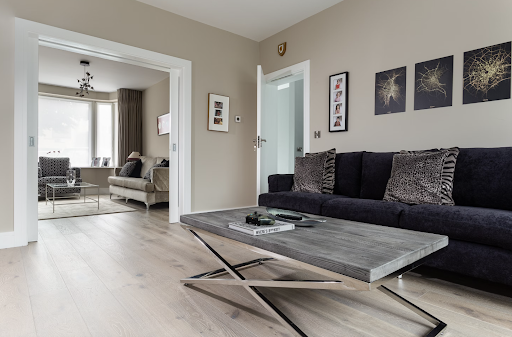When it comes to choosing the perfect flooring for your home, the options seem endless. Among the most popular choices are vinyl plank floors and laminate floors. Both offer a range of benefits, but they are not created equal. In this blog, we will explore the key differences between these two flooring options to help you make an informed decision for your next home improvement project.

1. Material Composition
Vinyl Plank Floors
Vinyl plank flooring, often referred to as luxury vinyl plank (LVP), is primarily composed of synthetic materials. It typically consists of multiple layers, including a wear layer, printed design layer, and a core layer, often made of PVC (polyvinyl chloride). The wear layer provides durability and scratch resistance while the design layer mimics the look of various natural materials, such as wood or stone.
Laminate Floors
Laminate flooring is constructed with a high-density fiberboard (HDF) core, which is a composite wood product. On top of the HDF core, there is a high-resolution photograph of the desired flooring pattern, which is then sealed with a protective layer. This protective layer is often made of melamine resin, which gives laminate flooring its durability.
2. Appearance and Aesthetics
Vinyl Plank Floors
One of the standout features of vinyl plank floors is their ability to replicate the look of natural materials with incredible realism. Advanced printing technology allows vinyl planks to mimic the texture, grain, and color variations found in hardwood or stone. This means you can achieve the aesthetic you desire without the associated maintenance or cost.
Laminate Floors
Laminate flooring also excels in replicating the look of natural materials, but it may not always achieve the same level of realism as vinyl planks. However, laminate does offer a wide range of design options and can convincingly mimic hardwood, tile, or stone, making it a popular choice for those seeking budget-friendly flooring with aesthetic appeal.
3. Durability and Water Resistance
Vinyl Plank Floors
Vinyl plank flooring is known for its exceptional durability and resistance to moisture. Its waterproof nature makes it an ideal choice for areas prone to spills, such as kitchens and bathrooms. Additionally, vinyl planks are less susceptible to scratches and dents compared to laminate, making them suitable for homes with pets or high foot traffic.
Laminate Floors
Laminate flooring is durable, but it is not waterproof. While it can withstand minor spills and moisture if cleaned promptly, prolonged exposure to water can cause the HDF core to swell and the planks to warp. This makes laminate less suitable for wet areas like bathrooms and kitchens unless you take extra precautions to prevent water damage.
4. Installation
Vinyl Plank Floors
Vinyl plank flooring is often praised for its ease of installation. It can be installed using a variety of methods, including click-and-lock, glue-down, or loose-lay installations. Many homeowners opt for DIY vinyl plank installations due to their simplicity, but professional installation is also an option for those who prefer it.

Laminate Floors
Laminate flooring also offers relatively straightforward installation options. The most common method is the click-and-lock system, which allows planks to snap together easily. While some homeowners tackle laminate installation as a DIY project, it’s important to note that achieving a smooth, professional finish may require more skill and precision than vinyl plank installation.
5. Maintenance and Cleaning
Vinyl Plank Floors
Maintaining vinyl plank flooring is hassle-free. Regular sweeping or vacuuming, along with occasional damp mopping using a mild cleaning solution, is usually sufficient to keep it looking pristine. The waterproof feature makes vinyl planks more forgiving when it comes to spills, making it an excellent choice for families with children or pets.
Laminate Floors
Laminate flooring is also easy to maintain, but it’s important to avoid excessive moisture during cleaning. Instead of wet mopping, use a damp cloth or a laminate-specific cleaning product to avoid water seeping into the seams and causing damage. While laminate is resistant to stains, it can be more susceptible to surface scratching compared to vinyl.
6. Cost
Vinyl Plank Floors
Vinyl plank flooring is available in a wide price range, making it accessible for various budgets. The cost depends on factors like the quality of the material, design, and installation method. Generally, it tends to be slightly more affordable than laminate flooring.
Laminate Floors
Laminate flooring is also budget-friendly, making it an attractive option for cost-conscious homeowners. Like vinyl, the price of laminate can vary based on factors such as thickness and design. However, it’s worth noting that premium laminate options with advanced features can be more expensive.
7. Environmental Considerations
Vinyl Plank Floors
While vinyl plank flooring has improved in terms of its environmental impact, it is still primarily composed of synthetic materials, including PVC. Some homeowners may have concerns about the sustainability and recycling of vinyl products, so it’s essential to research manufacturers who prioritize eco-friendly practices.
Laminate Floors
Laminate flooring, with its HDF core, may also raise environmental concerns. However, some manufacturers produce laminate products with recycled wood fibers and sustainable practices. It’s essential to check for certifications like the Forest Stewardship Council (FSC) when looking for eco-friendly laminate options.
Conclusion
In the vinyl plank floors vs. laminate floors debate, there is no one-size-fits-all answer. The choice between these two flooring options ultimately depends on your specific needs, budget, and aesthetic preferences. Vinyl plank flooring shines in terms of water resistance, ease of maintenance, and durability, making it an excellent choice for busy households. On the other hand, laminate flooring offers a wide range of design options at a budget-friendly price point.
Before making your decision, consider the location of the installation, your budget, and your environmental concerns. Both vinyl plank and laminate flooring have their strengths, so with careful consideration, you can find the perfect flooring solution to enhance the beauty and functionality of your home.

